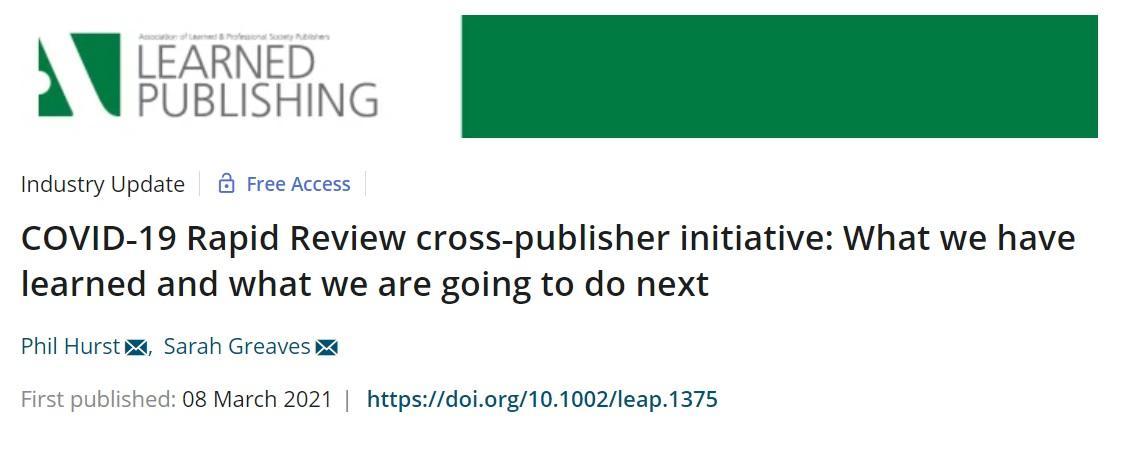 Flaminio Squazzoni
Flaminio Squazzoni
BEHAVE Lab, Department of Social and Political Sciences
University of Milan, Italy
Since the onset of the COVID-19 pandemic in early months of the last year, journals have been flooded by an unusually high number of submissions, while expecting a shortage of reviewers. This motivated some publishers to collaborate to improve the capacity of prompt responses of their journals to this unprecedented scale of submissions. During a pandemic in which demand for research increases so much, there is nothing more important that speeding up dissemination of findings while ensuring the quality of peer review.
In an article published by “Learned Publishing” on 8 March 2021, Phil Hurst and Sarah Greaves report on how the pandemic crisis sparked cross-publisher collaboration and their experience in the COVID-19 Rapid Review initiative, established in March 2020 to expand the pool of reviewers, encourage transfer of manuscripts between publishers, ensure that each article submitted to journal had a preprint and ensure that manuscripts had data. This initially involved important publishers, such as Hindawi, PLOS and The Royal Society among others, and a group of scholarly communication organizations, whose groups later expanded to other publishers, e.g., The MIT Press, Springer Nature and Cambridge University Press, among others.

What did we learn from this experience?
Decoupling dissemination from evaluation via preprint-submission links was key to ensure a relative isolation of peer review at journal level, though obviously reviewers were still working with higher pressures (e.g., delivering reports within five working days). This also permitted to fast-track COVID-19 papers. However, the paper reports that only 10% of Rapid Reviewers were actually invited to review for journals, thus revealing coordination problems with journal editors who presumably preferred to rely on their own pool of referees. Hurst and Greaves also found little author uptake of inter-publisher journal transfer option, probably due to the strategic choices of journal targeting by authors and their perceived disadvantages of sharing critical reports.
Regardless of these critical outcomes, Hurst and Greaves shared important insights on a cross-publisher initiative in the making. On the one hand, cross-publisher initiatives must be encouraged and the COVID-19 Rapid Review must be praised for this achievement. Collaboration between publishers creates social capital and trust in a typical competitive environment, such as the publishing industry, which in turn can promote other initiatives beneficial for the scientific community, e.g., journal data sharing, training initiatives, etc.. On the other, there are still obstacles that would require careful attention and dedicated efforts.
Top-down efforts to stimulate the open science agenda seem often to encounter resistance from the bottom level of academics.
This is because academics continue to be exposed to a hyper-competitive academic environment, in which publishing in top journals and citations are the reputational signal that matters. Finding ways to harmonize top-down strategic agendas, which emphasize transparency, openness and collaboration, with the incentives to which scientists respond, which are based on competition for priority and reputation, requires systematic research that could inform open science implementations and innovations with solid evidence. The COVID-19 Rapid Review and the related cross-publisher initiatives, whose learned lessons have been so brilliantly reported by two key figures of such praiseworthy initiatives, can be important milestone in this direction.
Reference
Hurst, P. and Greaves, S. (2021), COVID‐19 Rapid Review cross‐publisher initiative: What we have learned and what we are going to do next. Learned Publishing. https://doi.org/10.1002/leap.1375
